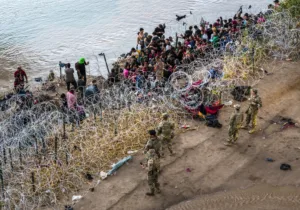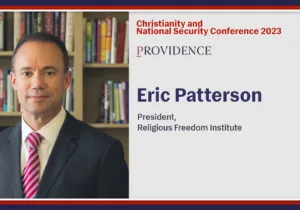From the outset of Christianity, Christ’s followers were the primary instruments for sharing the light and leaven of the Kingdom of Christ in the marketplace. This means that Christians were called to serve in all spheres of society, including being involved in serving in all agencies of government. Thus, when I started teaching at a Christian liberal arts college, I regarded my work not simply as the teaching of specific subjects but also as a means of equipping students to leave the academic environment to serve Christ in public life. In addressing the topic of the Christian faith and public policy, In my first article I outlined:
- How to integrate Christian faith and public policy;
- Described how some church groups have pursued immigration reform
In this final post I want to conclude by:
- Explaining why a communitarian perspective is important in addressing immigration issues; and
- Finally, sketching a framework that can help structure moral reasoning on immigration reform.
Two Theories of World Order
Fundamentally, two alternative worldviews or paradigms of our world are possible—communitarianism and cosmopolitanism. These two views are also captured by the terms statists and globalists. The first conceives of the international order as a society of states. This is the view reflected in the UN Charter. According to the UN system, the main actors in the international community are nation-states, which are entitled to sovereign independence and equality. This communitarian perspective acknowledges that while sovereign states are ultimately responsible for their own internal affairs, they also have responsibilities toward global society itself. At the heart of a communitarian perspective is the belief that individual wellbeing is connected to the communities in which people live—families, neighborhoods, associations, and nation-states. Although solidarity is sometimes used to emphasize transnational ties, communitarianism is rooted in the specific bonds that people develop in everyday life—at home, work, church. Communal bonds are important because they not only help to define our identity but also contribute to social trust—or what economist Paul Collier calls “mutual regard.” Without such trust, cooperation is difficult.
The alternative perspective—cosmopolitanism—assumes that states are morally insignificant and that borders tend to impede human dignity. For the cosmopolitan, people are first and foremost citizens of the world, and what matters most is their wellbeing. The rights of people trump the rights of states. Since Christians assume that all persons are created in God’s image and are entitled to dignity, Christian churches, especially the Roman Catholic Church, have historically emphasized the coherence and moral unity of the world. As a result, many believers are predisposed toward a cosmopolitan worldview—one that emphasizes global solidarity, rather than the fractured global society of nation-states. To be sure, the unity of the world is not conceived in political terms but rather as a spiritual community. St. Paul calls on Christians to pursue unity, declaring, “There is neither Jew, nor Greek, but we are all one in Christ.” But while the global community of faith is primarily concerned with the church, it nevertheless reinforces the universality and coherence of the temporal realm.
The approach of religious cosmopolitanism suffers, in my view, from a conflation of distinct worlds—namely the Kingdom of Christ and the Kingdom of Man, the church as the body of Christ and the state as the temporal kingdom of this world. To be sure, these two kingdoms or ways of life must intersect. Being a citizen of heaven does not remove people from their rights and obligations as citizens of this world. The challenge for Christians is to do what Jesus called his followers to do: namely, to give to caesar the things that are caesar’s and to God the things that belong to God.
Given the natural predilection to view the world as a coherent global society, it is not surprising that many Christian groups are predisposed toward a cosmopolitan perspective. The cosmopolitan worldview is not made explicit. Rather, in addressing immigration issues, churches emphasize values that reinforce global solidarity and minimize, if not neglect altogether, terms like sovereignty, government, citizenship, political legitimacy, and the rule of law. But by de-emphasizing, or even disregarding, the role of the state, they call into question the fundamental role of government in pursuing public justice—and more specifically in advancing a just immigration system.
In sum, how one conceives of the world will significantly affect how one views immigration issues. Since the chief responsibility of the state is justice, government should enact and enforce immigration policies that are based on consent. At the same time, nation-states are not hermetically sealed communities but also part of a global society. Domestic justice must be supplemented with international justice—with a concern for the welfare of people in other societies and especially with those who have fled their homeland because of privation or persecution. This is why I believe that both communitarian and cosmopolitan perspectives must be both included when Christians address immigration issues. My critique of church politics is that in addressing immigration concerns, the message of globalism and has overpowered the message of justice within states. Fostering an inclusive society and welcoming to strangers are important principles, but so too is democratic self-determination and the pursuit of citizens’ wellbeing.
If my analysis is correct, then the quest for just immigration rules must necessarily balance the rights of citizens with the rights and desires of migrants. Immigration policy is morally challenging precisely because it demands trade-offs among legitimate claims and moral principles. Examples of such trade-offs include:
- citizens vs. immigrants
- lawful migrants vs. unauthorized aliens
- family-sponsored immigrants vs. business-sponsored immigrants
- temporary workers vs. permanent immigrants
- refugees vs. immigrants
- protection of family unity vs. deportation
Advancing a Just Immigration Policy
How should Christians seek to advance a just immigration policy? I wrote Just Immigration because I concluded that many of the claims and demands by church groups did not reflect a competent integration of Christian ethics with the challenges posed by contemporary international migration. I have no objection to a group calling for a more generous, flexible policy on minors or an increase in the admission of refugees or economic migrants. But when churches use scripture or their religious authority to advance specific policies, I think they risk compromising their moral authority and deprive society of their potential contribution to moral reflection about important public concerns like immigration. Carl F.H. Henry, an evangelical ethicist and first editor of Christianity Today, offered some very wise advice when he declared that “the institutional church has no mandate, jurisdiction, or competence to endorse specific public policies.” As I noted earlier, scripture provides general principles and perspectives, but it is not a manual on politics. It should not be used to directly offer guidelines on immigration issues such as:
- The number of immigrants who should be admitted annually;
- The number of refugees who should be resettled;
- The criteria to be used in allocating immigrant visas;
- The balance between employment-based visas and family-based visas;
- Whether the diversity visa should be retained or abolished;
- Whether unauthorized aliens should be given a pathway citizenship.
If churches should not tell government what to do, what role should they play? Basically, churches and Christian groups should focus on moral education. They should illuminate how biblical norms and fundamental moral principles relate to the social and political problems. Their goal should be to assist parishioners and the general public with the moral assessment of issues. Since the clergy’s competence is in biblical ethics, they should apply their comparative advantage in biblical knowledge and theology and seek to proclaim and illuminate transcendent norms and avoid acting like a political interest group. If they make political advocacy a priority, they risk compromising their moral authority.
Since moral principles are not self-enforcing, church groups can help to illuminate how biblical morality applies to immigration concerns. Such analysis should make clear how the state and global order are conceived and then sketch how justice within and among states might be promoted. Such a task will necessarily involve insights from both the communitarian and cosmopolitan perspectives. From the communitarian logic, the development and enforcement of legitimate rules will depend on government institutions. But since moral obligations do not end at territorial borders, the cosmopolitan logic of meeting human needs of all peoples will necessarily contribute to initiatives that seek to care for those living beyond the state’s territorial borders.
In the end, little progress can be made toward improving the human condition of migrants without acknowledging the central role of the nation-state. Without defined, secure borders, a state is impossible. And if improvement in the human condition is sought, then it is imperative to build and sustain strong constitutional states. Without a capable state, the rule of law is impossible. And without the rule of law, human rights cannot be protected. To the extent that prosperity and human dignity have been advanced in the post-World War II era, it has come about through capable states that are also beneficent. The current refugee crisis is a direct byproduct of the collapse of states. Without an effective, legitimate government, law enforcement is impossible, and without constitutional government that can make and enforce rules, justice is unlikely. Thus, if we want to protect citizens’ rights and advance the wellbeing of migrants, we need constitutional regimes.
This essay is Part Two of a larger piece by Mark Amstutz from the Providence Print Edition. Part One can be read here.





